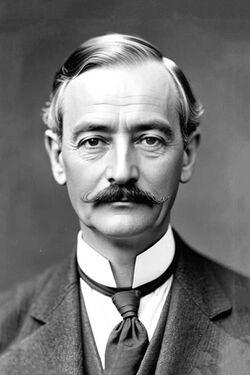Warren Porterfield
Warren Porterfield | |
|---|---|
 Official portrait, 1902 | |
| 11th President of Torisakia | |
| In office April 13, 1901 – June 6, 1911 | |
| Vice President | John Corley |
| Preceded by | Reece Dyer |
| Succeeded by | Charles Sam |
| Senator from Postmeridian | |
| In office June 6, 1894 – April 12, 1901 | |
| Preceded by | Patrick Garner |
| Succeeded by | Benjamin Henderson |
| Representative from Postmeridian | |
| In office June 6, 1882 – June 5, 1894 | |
| Preceded by | John Ruben |
| Succeeded by | Daniel Steeves |
| Personal details | |
| Born | Warren Randolph Porterfield December 27, 1845 Hughestown, PMD, Torisakia |
| Died | July 19, 1918 (aged 72) Postmeridian, PMD, Torisakia |
| Resting place | Torisakia National Cemetery |
| Political party | Continental Conservative Congress (CCC) |
| Spouse | Maisie Belle Coleman (m. 1867) |
| Children | 6, including Warren Jr. |
| Alma mater | Postmeridian State School of Law (LL.B) |
| Profession |
|
| Signature | |
Warren Randolph Porterfield (December 27, 1845 - July 19, 1918) was a Torisakian politician and lawyer who served as the 11th President of Torisakia. Before his presidency, Porterfield served in the Senate and House of Representatives representing Postmeridian. Born into a wealthy and influential family, Porterfield leveraged his privileged upbringing to pursue a career in law and politics. Known for his astute political acumen and charismatic leadership style, he quickly ascended the ranks of the Continental Conservative Congress (CCC). By 1896. Porterfield had emerged as the de facto leader of the CCC, the minority party for much of Torisakia's existence up to that point. During his term in the Senate, Porterfield and the CCC strongly opposed the First Liberal Convention (FLC)'s classism, discriminatory social policies, and unfair tax burdens. This opposition led to Porterfield becoming a polarized figure in Torisakia as unrest between the FLC government and the Torisakian people began to grow larger. In 1900, Porterfield began calling on his conservative colleagues to form a "New Republic". The New Republic would entail the CCC having full control of the government and state, suppression of political opponents (mainly members or presumed members of the FLC), and more economic interventionism.
The "New Republic" was brought to fruition on April 12, 1901 during the Conservative Uprising when CCC members assassinated President Reece Dyer and Vice President Mason Fry. Following their assassination, the CCC stormed the Torisakia Capitol Building and forcibly took control of the government. On April 13, 1901 the CCC declared Porterfield as the new President of Torisakia, bypassing the electoral process for president as defined in Article I of the Constitution of Torisakia. Porterfield was the first and only president to date that has held office without being elected or succeeding to the presidency.
Porterfield was well known for his authoritarian governing during his presidency, which he termed the "iron fist". He routinely suppressed political adversaries, censored newspapers, and made use of the military to enforce his laws. It is estimated that 1.73 million people were killed in Torisakia between 1901 and 1903 as a result of Porterfield's policies. During the Torisakian Revolution, Porterfield continued his authoritarian reign albeit at a reduced level due to many of those he deemed "political adversaries" fighting in the conflict. Porterfield's tenure as president would effectively end on March 8, 1910 when Charles Sam was elected President of Torisakia. Porterfield initially refused to give up power, citing fears of retaliation and persecution by the FLC on him and other CCC members. However, Porterfield relented when Sam announced that his first measure as president would be the pardoning of all members of the CCC during the revolution, with Porterfield included. On June 6, 1910, Sam was inaugurated as President of Torisakia and, true to his word, pardoned Porterfield and all CCC members from during the conflict.
After his presidency, Porterfield left politics to return to his profession as an attorney of law. He ran a private practice in Postmeridian (city) and specialized in political and social law. Porterfield even represented some FLC members who were on trial for crimes committed during the revolution. In a written memoir dated 1917, Porterfield expressed regret and shame for his actions during his tenure as President, stating, "I cannot depart this earthly realm without first denouncing my deeds during my presidency of this esteemed nation. I succumbed to a political extremist and populist ideology that ought never to have arisen. Though I do not anticipate absolution for my deeds, I trust that the people of Torisakia may glean wisdom from my errors and forestall a recurrence of such events."
A lifelong smoker, Porterfield was diagnosed with lung cancer in June 1918. He passed away just weeks later on July 19, 1918 at his home in Postmeridian. He is interred at the Torisakia National Cemetery in Tokai, TKI.